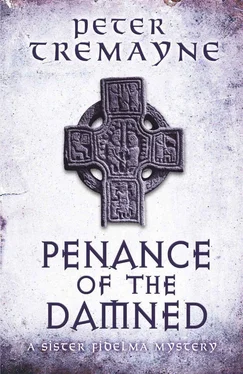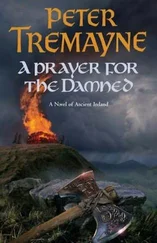Peter Tremayne - Penance of the Damned
Здесь есть возможность читать онлайн «Peter Tremayne - Penance of the Damned» весь текст электронной книги совершенно бесплатно (целиком полную версию без сокращений). В некоторых случаях можно слушать аудио, скачать через торрент в формате fb2 и присутствует краткое содержание. Год выпуска: 2016, Издательство: Headline, Жанр: Исторический детектив, на английском языке. Описание произведения, (предисловие) а так же отзывы посетителей доступны на портале библиотеки ЛибКат.
- Название:Penance of the Damned
- Автор:
- Издательство:Headline
- Жанр:
- Год:2016
- ISBN:нет данных
- Рейтинг книги:5 / 5. Голосов: 1
-
Избранное:Добавить в избранное
- Отзывы:
-
Ваша оценка:
- 100
- 1
- 2
- 3
- 4
- 5
Penance of the Damned: краткое содержание, описание и аннотация
Предлагаем к чтению аннотацию, описание, краткое содержание или предисловие (зависит от того, что написал сам автор книги «Penance of the Damned»). Если вы не нашли необходимую информацию о книге — напишите в комментариях, мы постараемся отыскать её.
Penance of the Damned — читать онлайн бесплатно полную книгу (весь текст) целиком
Ниже представлен текст книги, разбитый по страницам. Система сохранения места последней прочитанной страницы, позволяет с удобством читать онлайн бесплатно книгу «Penance of the Damned», без необходимости каждый раз заново искать на чём Вы остановились. Поставьте закладку, и сможете в любой момент перейти на страницу, на которой закончили чтение.
Интервал:
Закладка:
‘I argue for the law of the Faith,’ Abbot Nannid declared. ‘Gorman killed an abbot. Leviticus says that if anyone takes a life, then he must be put to death.’
‘Leaving aside the crucial matter of whether Gorman is guilty of the death of Abbot Segdae or not,’ Fidelma said tersely, ‘and I argue that it has yet to be proved – we are discussing whether the rules of an abbot can overturn the law of the land. It is obvious that they cannot. It remains against the law of our people to execute anyone. From the time of the High King Eochaid, who was known as Ollamh Fodhla, our laws have stood for compensation to the victim and the rehabilitation of the perpetrator. How can the victim and the victim’s family be compensated by a dead, corrupting body? How can a corpse be rehabilitated?’
‘There is a New Faith in this land, Fidelma of Cashel. You are neglecting the Faith for the old pagan laws.’
‘What is your justification for ignoring the laws of our country?’ insisted Fidelma.
Abbot Nannid shrugged. ‘Do I need a justification? I am Abbot of Mungairit, Chief Bishop of the Ui Fidgente. I repeat that we have been guided to the New Faith and embraced it. It is the Faith and its laws to which we are now answerable.’
Fidelma shook her head sadly. ‘When the High King Loeguire mac Neill embraced Christianity, he took the New Faith to a council of law-makers, just as we have done for over a thousand years since Ollamh Fodhla organised the first council. The purpose of Loeguire’s council was to examine our laws to see if they were compatible with the New Faith.’
‘Is this history lecture relevant? We have heard it all before,’ the abbot appealed to Prince Donennach. The prince did not respond so Fidelma answered.
‘Then you should know your history well, Nannid of Mungairit. You know that the learned men of our people sat and studied the laws and finally had them committed to writing. Of those who sat on the council there was Loeguire the High King himself; my own ancestor, Conall Corc, King of Muman, and Daire, King of Ulaidh. They were the three most important of the kings, and they were advised by three of our most senior judges: Dubhthach Mac Ua Lugair, the Chief Brehon and Chief Bard of the Five Kingdoms; the Brehon Rossa mac Trechim, and Brehon Fergus an Bhaird. They also sat with the Blessed Patrick, with his greatest convert and successor at Ard Macha, Benen mac Sessenen; he who had also been a prince of our people was converted by Patrick and took the name Benignus. Lastly there was the Blessed Cairneach. These last three were considered the greatest teachers of the New Faith at that time.’
‘Most of us know our history,’ Abbot Nannid said arrogantly. ‘We don’t need a lesson in what happened from you, Sister Fidelma.’
‘But you obviously do need a lesson to know the meaning of what happened,’ she corrected him. ‘You should know that when that council put our laws into writing, it was stated in the introduction to the great text: “What did not clash with the word of God in the written Law and in the New Testament, and with the conscience of the believers, was confirmed in the law of the Brehons by Patrick and by the ecclesiastics and the princes of Eireann in this, the Senchus Mor .” The laws of the Brehons are therefore clearly the laws of the Faith.’
Brehon Faolchair, amid the murmuring of approval from several, began to smile broadly at the point. ‘So you argue that our law, as approved by Patrick and the first Christians here, is a Christian law for it did not clash with the word of God or the Christian Gospels?’
Abbot Nannid made a cutting motion with his hand.
‘Since those days we have had more contact with the scholars of the Christian world in the east. We have sat too long beyond its borders. The scholars there have pointed out to us the errors of our early assumptions. It is to the Penitentials that we must now turn, as they have revised the old laws.’
Prior Cuan now rose, leaning on his stick, and hobbled towards the Abbot of Mungairit.
‘Errors?’ he repeated in a shaky voice. ‘Do you accuse the Blessed Patrick of error? In Muman, the Faith was even brought here before Patrick by great scholars and teachers like Ailbe who founded my own Abbey of Imleach; by Ibar, Abban, Declan and Ciaran. Were these saintly scholars in error – and were the generations of great and holy men who followed them?’
‘Yes, they were in error,’ replied the abbot, unabashed. ‘How many had time to sit and reflect on the great work ordered by Damasus, the Bishop of Rome, who commissioned Eusebius of Stridon to translate the texts in a form which the faithful priests of Christ could understand? In those scriptures you will find the laws of God, the Patriarchal Laws which the followers of the Faith must obey and not question. I presume that you, Cuan, who call yourself a scholar of the Faith, have read these laws which now must supersede the laws of the unenlightened?’
Prior Cuan chose his words carefully. ‘I have studied the texts, Abbot Nannid of Mungairit. You often quote the Old Testament rather than the teachings of the Christ. So let me ask you, what is the Old Testament to us? It is a collection of texts about the ancient people of Israel whose language and culture are barely intelligible to us, even if we have studied it. We are told that the Christ emerged from such a people and their culture. At the same time, the disciples, such as Paul of Tarsus, and the Church Fathers that followed him, tell us that Christ’s people rejected him and had him executed. His people did not want his teachings which had replaced so many of their laws and concepts.
‘We are told by the Blessed Paul that the words of Christ were to be brought to those not of the culture of the Old Testament. So we ask ourselves why are these texts part of our scriptures unless merely to show us the history and the type of people who came to reject the Christ? Why are we so confused by these old texts that many Christian councils cannot even agree on what texts constitute the Holy Scripture that we should adopt as our own Faith?
‘You remind us that Damasus the First, the Bishop of Rome, commanded Eusebius to translate the ancient texts into Latin. We find that this very act provoked arguments between Eusebius and Augustine of Hippo at the Council of Carthage … everyone had different opinions as to what should be left in and what should be left out of the final work.’ Prior Cuan paused, shaking his head in disgust. ‘What has the Tanakh , the Hebrew history of the Israelites and their battles, their philosophers and religion, to do with our equally ancient history, law and philosophies? Why should we accept the history and legends of the Israelites as more worthy than the history and legends of our own people? Instead of the Tanakh , why not accept the Lebor Gabala Erenn ? Why should we throw away our very being for a culture from the other side of the world?’
The Prior of Imleach sank back on his seat. Fidelma gazed in amazement at the quiet passion of Cuan. Here was erudition indeed.
Abbot Nannid was now white-faced with anger. ‘You are speaking heresy,’ he shouted when he could no longer contain himself.
‘He is denying the Faith!’ Brother Cuineain echoed his master. Even Brother Tuaman, the prior’s steward, appeared to be troubled.
‘Not so!’ Prior Cuan replied, still seated. ‘I fully accept the word of Christ and the founding fathers of the Faith. What I am saying is that the texts of the ancient history and religion of the land in which Christ came into this world, and whose people rejected Him, are of no more worth than any other. What is more important is what Christ actually taught and the teachings that have been passed on to us in the manner of His New Faith.’
Читать дальшеИнтервал:
Закладка:
Похожие книги на «Penance of the Damned»
Представляем Вашему вниманию похожие книги на «Penance of the Damned» списком для выбора. Мы отобрали схожую по названию и смыслу литературу в надежде предоставить читателям больше вариантов отыскать новые, интересные, ещё непрочитанные произведения.
Обсуждение, отзывы о книге «Penance of the Damned» и просто собственные мнения читателей. Оставьте ваши комментарии, напишите, что Вы думаете о произведении, его смысле или главных героях. Укажите что конкретно понравилось, а что нет, и почему Вы так считаете.












